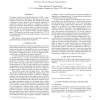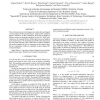50 search results - page 5 / 10 » Speaker and Channel Factors in Text-Dependent Speaker Recogn... |
ICASSP
2011
IEEE
12 years 11 months ago
2011
IEEE
We propose Cross-Channel Spectral Subtraction (CCSS), a source separation method for recognizing meeting speech where one microphone is prepared for each speaker. The method quick...
PERCOM
2010
ACM
13 years 9 months ago
2010
ACM
We present an unsupervised speaker identification system for personal annotations of conversations and meetings. The system dynamically learns new speakers and recognizes already k...
ICASSP
2009
IEEE
14 years 2 months ago
2009
IEEE
This article presents several techniques to combine between Support vector machines (SVM) and Joint Factor Analysis (JFA) model for speaker verification. In this combination, the...
ICASSP
2011
IEEE
12 years 11 months ago
2011
IEEE
This article presents an attempt to link the uploaders of videos based on the audio track of the videos. Using a subset of the MediaEval [10] Placing Task’s Flickr video set, wh...
SPEECH
2010
13 years 2 months ago
2010
Despite years of speech recognition research, little is known about which words tend to be misrecognized and why. Previous work has shown that errors increase for infrequent words...


